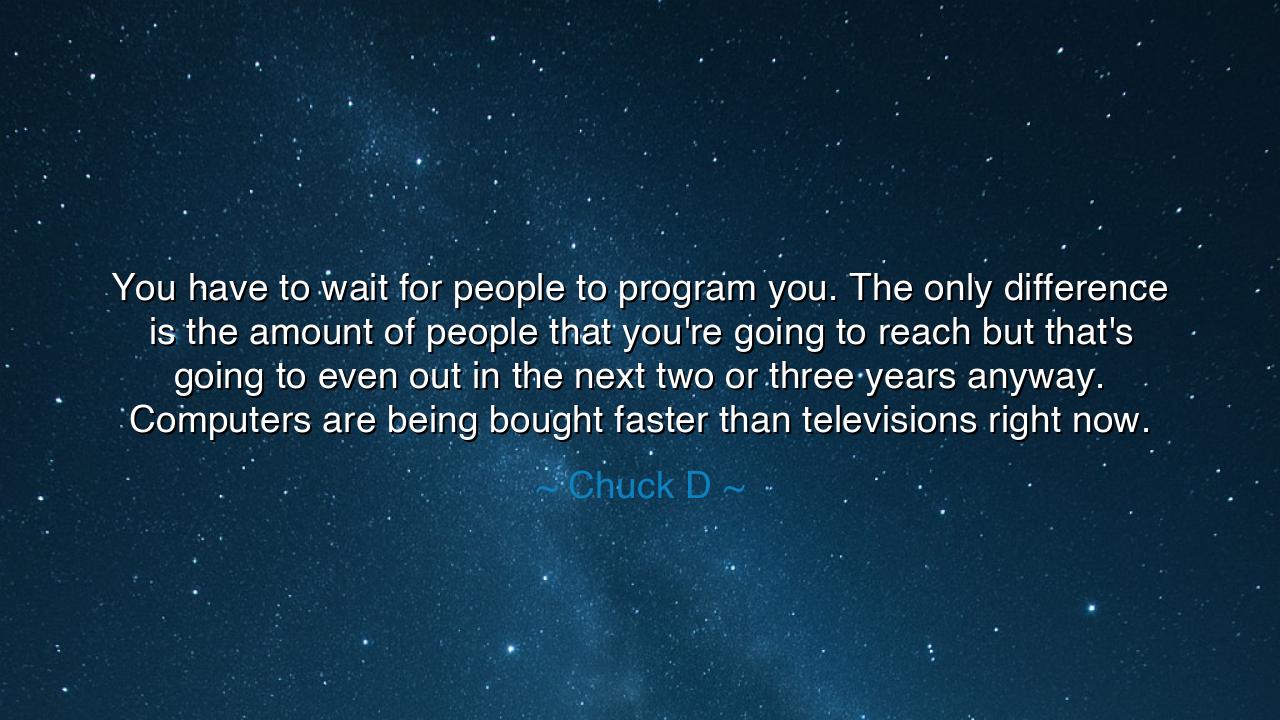
You have to wait for people to program you. The only difference
You have to wait for people to program you. The only difference is the amount of people that you're going to reach but that's going to even out in the next two or three years anyway. Computers are being bought faster than televisions right now.






"You have to wait for people to program you. The only difference is the amount of people that you're going to reach but that's going to even out in the next two or three years anyway. Computers are being bought faster than televisions right now." These words, spoken by Chuck D, offer a poignant reflection on the role of technology in shaping society, and the influence it exerts over the individual. Chuck D, the revolutionary figure behind the legendary group Public Enemy, often spoke with clarity about the intersection of culture and technology. In this statement, he draws attention to how society, much like computers, is being programmed—not just by technology itself, but by the systems of media and communication that surround us. The quote illuminates a truth: that in this age of information, we are all, to some extent, shaped and influenced by the forces that control the flow of knowledge and communication.
In the ancient world, great thinkers like Socrates and Plato questioned the impact of external influences on the individual. Socrates famously asked, "What is the good life?" and sought to uncover the forces that shaped human behavior. He recognized that many individuals were not fully aware of the forces that shaped their thoughts and actions. Plato, in his allegory of the cave, depicted the prisoners who only saw shadows of reality, unable to recognize that their perceptions were shaped by external forces. Similarly, Chuck D’s words suggest that modern society has become like those prisoners, trapped by the influences of media, technology, and external programming. We are all living in a world where computers, the digital tools that were once the stuff of fantasy, now shape and define our lives in ways unimaginable just a few decades ago.
Consider the story of Gutenberg, who revolutionized the way information was shared by inventing the printing press. In his time, books were expensive and rare, and only the elite had access to the knowledge that could be conveyed through writing. Gutenberg’s invention democratized knowledge, allowing for the spread of ideas far beyond the reach of the wealthy few. Yet, even in this great leap forward, the printing press was still a tool that shaped how people understood the world. Gutenberg did not just create a tool for disseminating information, but a mechanism that helped shape the intellectual world by making ideas more accessible to the general public. Similarly, Chuck D’s words remind us that computers and technology are tools that not only help us communicate but also influence the way we think and act.
In modern society, we see how technology—especially computers—has become so ubiquitous that they are no longer just tools; they have become extensions of our minds. The rise of social media, the internet, and digital communication has radically shifted how information is shared and received. As Chuck D points out, the rapid rise of computers—faster than televisions—illustrates how we have entered an era where digital technology dominates our attention. From the moment we wake up until we fall asleep, we are constantly programmed by the information and media that flow through the digital channels we interact with. Like a prisoner of the digital age, we are constantly fed information, ideas, and values that influence our behavior in ways we may not always recognize.
Yet, as in the story of Gutenberg, knowledge and technology are double-edged swords. While the accessibility of information has led to unprecedented empowerment, it has also opened the door to manipulation and control. Just as Plato warned that unchecked influences can keep individuals in ignorance, Chuck D reminds us that we are living in an era where the lines between independence and programming have become blurred. The digital world, while giving voice to the masses, also has the power to manipulate those voices, to lead them down paths that may not be of their own choosing.
The lesson from Chuck D’s words is one of awareness and critical thinking. Just as Plato urged his students to question their perceptions and break free from the shadows of the cave, we too must examine the information that shapes our lives. In this age of technology, we must remain vigilant about the forces that program us, and actively seek to empower ourselves by making informed decisions about the information we consume. The key lies not in rejecting technology, but in using it wisely, in filtering out the noise, and in taking control of our own thoughts and actions.
In practical terms, this means that we must learn to filter the information we encounter, to question its source, and to be aware of the ways in which we are being shaped by the technology around us. Just as Gutenberg’s press allowed people to shape their own ideas, so too must we use the tools of the digital age to empower ourselves and not to fall victim to the forces that seek to control us. By fostering critical thinking, self-awareness, and a commitment to independent thought, we can ensure that we do not become mere pawns in a system of digital programming, but rather active participants in the creation of our own lives.






AAdministratorAdministrator
Welcome, honored guests. Please leave a comment, we will respond soon